|
|
|
Sort Order |
|
|
|
Items / Page
|
|
|
|
|
|
|
| Srl | Item |
| 1 |
ID:
090220
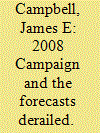

|
|
|
|
|
| Publication |
2009.
|
| Summary/Abstract |
On September 8, 2008, the Trial-heat Forecasting Model predicted that in-party candidate Senator John McCain would receive 52.7% of the national two-party popular presidential vote. The forecast of a victory of modest proportions for Senator McCain reflected his having a five-percentage-point lead over Senator Barack Obama in Gallup's early September, post-convention poll (49% to 44%) and the Bureau of Economic Analysis' August report of a 3.3% GDP growth rate in the second quarter of the year, about average for a second quarter election year economy.
|
|
|
|
|
|
|
|
|
|
|
|
|
|
|
|
| 2 |
ID:
131985
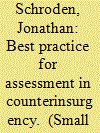

|
|
|
|
|
| Publication |
2014.
|
| Summary/Abstract |
In September 2011, the Commander of the International Security Assistance Force (ISAF) in Afghanistan directed the Afghan Assessment Group to redesign the way in which ISAF was assessing the status of the war, and to be 'revolutionary' in so doing. The resulting assessment paradigm was novel, non-doctrinal, and effectively addressed the unique complexities of the counterinsurgency in Afghanistan and the needs of the ISAF Commander. It had a two-tier structure consisting of both strategic and campaign assessments. The former focused on answering a set of strategic questions in narrative, analytic form to address the strategic environment, while the latter used a set of standards and accompanying narrative responses to gauge accomplishment of campaign tasks. Both tiers captured the current state of the war while maintaining an eye on future challenges and opportunities. The two assessments and their associated processes were designed to stimulate discussions leading directly to decisions by senior leaders on actions they could take, direct, or request. While any assessment paradigm will have advantages and disadvantages, an examination of the pros and cons of this assessment paradigm makes clear that it should be considered a 'best practice' in the field of counterinsurgency assessment.
|
|
|
|
|
|
|
|
|
|
|
|
|
|
|
|
| 3 |
ID:
157482
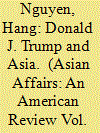

|
|
|
|
|
| Summary/Abstract |
This paper seeks to examine candidate Trump's campaign rhetoric about Asia and President Trump's policy toward Asia. It will look at Trump's announcements during his presidential campaign and show that Trump, the candidate, had made various proposals on the U.S. approach to China and American allies in Asia, which had made Asian capitals deeply concerned. In the Asian view, if Trump's campaign promises were realized, the world would be characterized by political tensions, trade protectionism, and arms races. The paper goes on to examine the Trump administration's foreign policy toward American allies in Asia and toward China. It demonstrates, that though the United States are being governed by a new administration—The Trump administration—the U.S. national interest and constitution do not change. President Trump and his administration have found it necessary to maintain many elements of Obama's Asia policy for U.S. interests.
|
|
|
|
|
|
|
|
|
|
|
|
|
|
|
|
| 4 |
ID:
143711
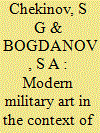

|
|
|
|
|
| Summary/Abstract |
The authors discuss military systematology, a complex subject of modern science that is highly relevant and much in demand in our days, and its influence on modern military art.
|
|
|
|
|
|
|
|
|
|
|
|
|
|
|
|
| 5 |
ID:
163412
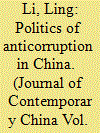

|
|
|
|
|
| Summary/Abstract |
This article traces the process of Xi Jinping’s campaign in 2012–2017 and explains how an anticorruption effort has been transformed into an exercise of power-consolidation for his office. The findings of this article are three-fold. First, the power-consolidation process has benefited from a combination of an ideological campaign and a disciplinary campaign, which were not only synchronized but also feed into one another to achieve a shared goal. Second, the campaign became politicized around midterm and intensified afterwards. The pace of progress of the campaign coincided with Xi Jinping’s advancement of power. Third, the most significant outcome of Xi Jinping’s campaign is not the numbers of disciplined corrupt officials but the paradigm-change in the disciplinary regime of the Party: first, the reversal of the depoliticization process of the Party’s disciplinary regime; second, the retention of temporarily mobilized anticorruption resources; and third the simplification of evidence production procedure. The combined result is a considerable expansion of the CCDI’s anticorruption investigative capacities and a significant increase Xi Jinping’s leverage to impose political loyalty and compliance upon Party officials in the future.
|
|
|
|
|
|
|
|
|
|
|
|
|
|
|
|
| 6 |
ID:
144372
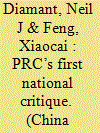

|
|
|
|
|
| Summary/Abstract |
This article is the first detailed exposition of the “National Discussion of the Draft Constitution”. In mid-1954, Chinese engaged in a wide-ranging deliberation about political and social rights, the obligations of citizenship, state symbols, political institutions and ideology. Many asked penetrating and frequently prescient questions about law, citizenship, class and political power, and offered provocative suggestions for revision. Using archives and intra-Party publications, we argue that, for citizens, the constitutional discussion constituted the earliest national-level, semi-public exposé and critique of the entirety of CCP governing practices—a “dress rehearsal” for the 1956 Hundred Flowers Movement. For officials, the constitutional discussion provided an opportunity to deploy the coercive language of “state law” to overcome resistance to collectivization, and a tactic to deal with “unruly” citizens. We further suggest that the 1954 discussion set the terms of broad-based, but ultimately limited, constitutional critique from the 1950s until the present.
|
|
|
|
|
|
|
|
|
|
|
|
|
|
|
|
| 7 |
ID:
131668
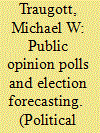

|
|
|
| 8 |
ID:
145077
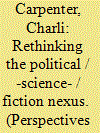

|
|
|
|
|
| Summary/Abstract |
A burgeoning literature in IR asserts there is a relationship between pop cultural artifacts and global policy processes, but this relationship is rarely explored using observational data. To fill this gap, I provide an evidence-based exploration of the relationship between science-fiction narratives and global public policy in an important emerging political arena: norm-building efforts around the prohibition of fully autonomous weapons. Drawing on in-depth interviews with advocacy elites, and participant-observation at key campaign events, I explore and expand on constitutive theories about the impact of science fiction on “real-world” politics.
|
|
|
|
|
|
|
|
|
|
|
|
|
|
|
|
| 9 |
ID:
180892


|
|
|
|
|
| Summary/Abstract |
Peace referendums can be exploited by political actors who may gain politically from opposing a peace process. This article explores how political opposition affects peace negotiations, particularly when a referendum is used to ratify an agreement, through the study of the Colombian peace negotiations between the government of President Santos and the Revolutionary Armed Forces of Colombia (FARC). It finds that the exclusive character of the negotiations, coupled with their confidentiality, contributed to the political opposition’s capacity to influence public opinion against the peace process and to reject the peace agreement in the 2016 referendum. This qualitative study is based on the content analysis of reports, memoirs and interviews with key negotiation delegates, journalists and representatives of the referendum campaigns. It argues that political inclusion in peace negotiations can help prevent referendum spoiling, while public information and education during the negotiations can reduce the impact of disinformation and manipulation campaigns.
|
|
|
|
|
|
|
|
|
|
|
|
|
|
|
|
| 10 |
ID:
177616
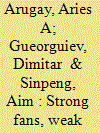

|
|
|
|
|
| Summary/Abstract |
The 2016 presidential contest is widely considered as the first “social media election” in the Philippines. At the same time, it remains unclear if or how social media helped Rodrigo Duterte mobilize voters to gain victory. There are three main social media campaigning models: broadcast, grassroots, and self-actualizing. Analysis of twenty million activities and 39,942 randomly sampled comments across the official Facebook pages of key presidential candidates supports the grassroots model as Duterte's profile was the most engaged, even if Duterte himself was not actively engaged. Such inconsistencies raise the prospect that Duterte's online prominance was fabricated by paid trolls and fake accounts. Instead, our analysis suggests that Duterte's digital fanbase was, at least in part, a reflection of offline, grassroots political support. In particular, data from an original survey of 621 respondents suggests that Duterte supporters were not only aggressive in their support for Duterte online, they were also more committed to him offline as well. These findings add to a growing literature on social media and politics that seeks to understand the broader ecosystem of online political discourse, rather than focusing on the actions and strategies of political campaigns. They also underscore the fine line between fabricated support and genuine political fervor.
|
|
|
|
|
|
|
|
|
|
|
|
|
|
|
|
|
|
|
|
|